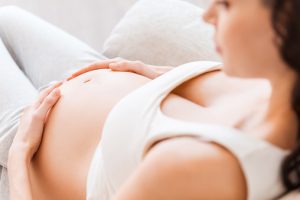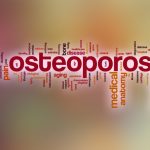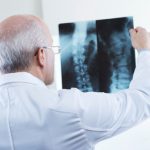 Osteoporosis is a condition largely found among women – although men are not immune to developing it. It affects the bones, making them weak and brittle. Even everyday activities can become difficult for a person with osteoporosis because there is fear of a fracture from even the smallest amount of added stress on the bones.
Osteoporosis is a condition largely found among women – although men are not immune to developing it. It affects the bones, making them weak and brittle. Even everyday activities can become difficult for a person with osteoporosis because there is fear of a fracture from even the smallest amount of added stress on the bones.
There are many factors which can contribute to the onset of osteoporosis, but the latest findings have uncovered that pregnancies which occur close together – short time gap in between – are linked with osteoporosis.
Advertisement
Reproductive histories were compared between 239 postmenopausal women who had osteoporosis and 298 women – also postmenopausal – without thinning bones. Researchers found the risk of osteoporosis increased four-fold for women who had pregnancies no more than 12 months apart.
Menopause occurs when menstruation ends, usually between the ages of 45 and 55. Estrogen production diminishes in the years leading up to menopause. After menopause the body will also slow down production of new bone tissue, which puts women in the group at higher risk for menopause.
Aside from comparing the reproductive history of the women, bone tissue was also analyzed. This study revealed to the researchers that pregnancy before age 27 also increases the risk of osteoporosis.
Among women who waited two to three years between each pregnancy there wasn’t an evident higher risk for osteoporosis. The same was true for women who waited five years or more between pregnancies.
Common factors which can contribute to osteoporosis, like diet, exercise and the use of birth control, were not examined – merely the time gap between pregnancies. This may have skewed the findings along with the poor recollection between pregnancies reported by the women.
Pregnancy affects bones because calcium goes first to the baby, and then later returns back to the mother after breastfeeding. It can take some time for the calcium to restore in the mother, so when another pregnancy occurs soon thereafter, enough time may not have lapsed to allow for bone density to be restored.
Risk factors for osteoporosis
 Aside from the new findings which link close pregnancies to an increased risk of osteoporosis, there are other risk factors as well which may increase a women’s risk of developing the bone condition. Risk factors for osteoporosis include:
Aside from the new findings which link close pregnancies to an increased risk of osteoporosis, there are other risk factors as well which may increase a women’s risk of developing the bone condition. Risk factors for osteoporosis include:
- Race – osteoporosis generally occurs in Asians and Caucasians
- Family history – if a family member has had osteoporosis your risk goes up
- Body size/frame – women with a smaller body type are at higher risk
- Lower sex hormones
- Problems with the thyroid
- Overactive adrenal gland
- Low calcium intake
- Eating disorders
- Gastrointestinal surgery – reducing the size of your stomach minimizes the amount of essential nutrients which are absorbed
- Steroids and some medications
- Sedentary lifestyle
- Excessive alcohol consumption
- Smoking
Although some of these factors cannot be moderated, there are many risk factors which you can control to help lower your risk of developing osteoporosis.
Symptoms of osteoporosis
In the early stages of osteoporosis the condition is symptomless. Once bone loss has progressed and the bones have become weakened, symptoms may be:
- Back pain caused by fracture of collapsed vertebrae
- Loss of height – you may notice you are becoming shorter
- Stooped posture
- Easily occurring bone fractures
Tips to prevent osteoporosis
As mentioned, some risk factors which increase your risk of osteoporosis are unchangeable, but there are many factors which can help you prevent osteoporosis. Some easy ways to prevent osteoporosisare:
- Become aware of your bone density – whether you’re pre or postmenopausal ensure you visit your doctor to get your bone density checked.
- Enjoy calcium – even if you can’t have dairy, many vegetables and fortified foods contain good amounts of calcium. Before you embark on calcium supplements speak with your doctor to ensure it is safe for you to take.
- Reduce salt, caffeine and alcohol intake –all are shown to weaken bones
- Exercise more
- Get adequate magnesium and potassium
- Eat well
Osteoporosis prevention diet
Calcium is stored in our bones and is what helps keep them strong, but without vitamin D absorption of calcium becomes greatly reduced. Even if you consume the recommended amount of calcium – 1200 mg – your body won’t absorb nearly as much without the presence of vitamin D.
Here are foods you can enjoy that contain calcium and vitamin D to promote bone health and help you better prevent osteoporosis.
- Broccoli
- Collard greens
- Kale
- Bok choy
- Turnip greens
- Tofu
- Baked beans
- Pork
- Shrimp
- Tuna
- Salmon
- Mackerel
- Eggs
- Milk
- Yogurt
- Cheese
- Ice cream
- Calcium-fortified juices and cereals
If you can incorporate foods into your diet to promote bone health, as well as partake in other lifestyle tips, you can better reduce your risk of developing osteoporosis.
Related Reading:
4 factors which contribute to bone loss
Bone loss, and more specifically osteoporosis, is often identified as a female health problem, but men are not immune to losing bone density. There are many factors which can contribute to bone loss, so practicing bone-boosting habits is essential, especially as you age. Continue reading…
Advertisement
Is this bone disease affecting your hearing?
According to the International Osteoporosis Foundation one in three women over the age of 50 will develop osteoporosis – a disease categorized by bones becoming weak and brittle. While commonly referred to as a woman’s disease, men are not immune. Continue reading…
Sources:
http://www.reuters.com/article/2015/08/25/us-health-bones-pregnancy
http://www.mayoclinic.org/diseases-conditions/osteoporosis/basics/symptoms
//www.belmarrahealth.com/7-quick-tips-to-improve-your-bone-density
//www.belmarrahealth.com/osteoporosis-prevention-diet-plan


